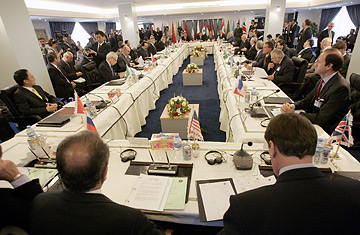
Delegates attend the opening of the groundbreaking peace conference in Baghdad, Iraq, Saturday, March 10, 2007. Iraqi Prime Minister Nouri al-Maliki appealed Saturday for international help to cut off networks aiding extremists and warned envoys from neighbors and world powers that Iraq's growing sectarian bloodshed could spill across the Middle East.
Late last year, following the Hizballah-Israel clash in Lebanon and mounting tensions over Iran's nuclear program, the Administration appeared to retire the claim that its Middle East policy was about spreading democracy, and instead emphasized a split in the region between moderate, "responsible" regimes such as Egypt, Jordan and Saudi Arabia, and "extremists" led by Iran and Syria, along with movements such as Hizballah and Hamas. The U.S. would overlook the authoritarian nature of the "responsible" regimes to focus on the more immediate goal of rallying their support against Iran.
This narrative hailed the sudden diplomatic exertions of the usually reticent Saudi regime, which was growing alarmed at the increasing Iranian influence in Lebanon, Iraq and the Palestinian territories (where Hamas had responded to U.S.-led efforts to isolate it by drawing closer to Tehran). But what has become abundantly clear is that the Saudis' ideas on how to respond to Iran are quite different from those of the Bush Administration. Even as they offer financial support to those standing up to Iran and its allies, the Saudis have also been actively engaging with Tehran, recognizing that its influence is a reality that cannot simply be eliminated.
So, while Washington has called for Iran to be isolated and has refused to talk to Tehran, the Saudis have been holding discussions with Iran for months. The first clear fruit of those talks is visible in Lebanon, where Iran and Saudi Arabia appear to have walked their allies there back from the brink of civil war, and put them on the path towards finding new terms for coexistence. On the Palestinian front, while Washington has demanded that its allies keep Hamas isolated — and pressed Palestinian Authority president Mahmoud Abbas to resist calls to join the Islamists in a unity government — the Saudis brought the two Palestinian factions together in Mecca and brokered just such a coalition government, due to be formalized this week.
Those examples suggest that the diplomatic process now under way over Iraq is unlikely to further the U.S. goal of isolating Iran. The Iraqi government, which initiated Saturday's talks, wants no part of any regional alliance to confront Iran, insisting that its territory not be used as a base for confrontation between the two powers. While it depends on the U.S. for its security, the government is nonetheless dominated by Shi'ite parties allied with Iran. What happens in the diplomatic process Baghdad has initiated may be as important as the U.S. troop surge: U.S. commander General David Petraeus made clear last week that there can be no military victory in Iraq — the military campaign aims to create a window of improved security in which a political deal must be forged among all the belligerents. Such a deal must almost certainly be accompanied by a regional accord that precludes external support to the warring factions.
Indeed, if Saudi Arabia and Iran were able to find an incentive to cooperate in cooling tensions in Lebanon, the incentive ought to be that much greater in the case of Iraq, given its proximity and the negative fallout both will suffer in the event of a sectarian meltdown of Iraq. Such cooperation would help stabilize Iraq, but there's no room in there for a strategy of isolating and confronting Iran. The Saudis appear inclined to find a way of living with Iran, accommodating its interests while aggressively protecting their own. The Bush Administration may soon discover that, as far as diplomacy goes, that's the only game in town.
